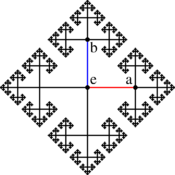Template:Are You Sure/October 3: Difference between revisions
No edit summary |
No edit summary |
||
| (4 intermediate revisions by the same user not shown) | |||
| Line 1: | Line 1: | ||
[[File:Cayley graph of F2.svg|link=Arthur Cayley (nonfiction)|175px|thumb|A Caley graph encodes the abstract structure of a group using a specified, usually finite, set of generators for the group.<br>This Cayley graph shows the free group on two generators ''a'' and ''b''.]] | [[File:Cayley graph of F2.svg|link=Arthur Cayley (nonfiction)|175px|thumb|A '''[[Arthur Cayley (nonfiction)|Caley graph]]''' encodes the abstract structure of a group using a specified, usually finite, set of generators for the group.<br><br>This Cayley graph shows the free group on two generators ''a'' and ''b''.]] | ||
• ... that mathematician [[Arthur Cayley (nonfiction)|Arthur Cayley]] (16 August 1821 – 26 January 1895) was the first to define the concept of a group in the modern way (as a set with a binary operation satisfying certain laws); and that formerly, when mathematicians spoke of "groups", they had meant permutation groups? | • ... that mathematician '''[[Arthur Cayley (nonfiction)|Arthur Cayley]]''' (16 August 1821 – 26 January 1895) was the first to define the concept of a group in the modern way (as a set with a binary operation satisfying certain laws); and that formerly, when mathematicians spoke of "groups", they had meant permutation groups? | ||
• ... that mathematician '''[[Robin Farquharson (nonfiction)|Reginald Robin Farquharson]]''' (3 October 1930 – 1 April 1973) worked on [[Game theory (nonfiction)|game theory]] because he was interested in both mathematics and politics; and that Farquharson's doctoral thesis, which analyzed voting systems, was influential when later published as ''Theory of Voting'' (Oxford: Blackwell, 1970)? | • ... that mathematician '''[[Robin Farquharson (nonfiction)|Reginald Robin Farquharson]]''' (3 October 1930 – 1 April 1973) worked on [[Game theory (nonfiction)|game theory]] because he was interested in both mathematics and politics; and that Farquharson's doctoral thesis, which analyzed voting systems, was influential when later published as ''Theory of Voting'' (Oxford: Blackwell, 1970)? | ||
• ... that physicist and | • ... that '''''[[2001: A Species Odyssey]]''''' is a short documentary film about the ethical dilemma faced by two astronauts (Frank Bowman and David Poole) when they discover an alien-human hybrid child stowed away on their spaceship? | ||
• ... that physicist and astrophysicist '''[[Robert F. Christy (nonfiction)|Robert F. Christy]]''' was distraught at the outcome of the 1954 [[Oppenheimer security hearing (nonfiction)|Oppenheimer security hearing]]; and that when Christy encountered [[Edward Teller (nonfiction)|Edward Teller]], who had testified against Oppenheimer, Christy publicly refused to shake Teller's hand? | |||
Latest revision as of 04:52, 4 October 2020

This Cayley graph shows the free group on two generators a and b.
• ... that mathematician Arthur Cayley (16 August 1821 – 26 January 1895) was the first to define the concept of a group in the modern way (as a set with a binary operation satisfying certain laws); and that formerly, when mathematicians spoke of "groups", they had meant permutation groups?
• ... that mathematician Reginald Robin Farquharson (3 October 1930 – 1 April 1973) worked on game theory because he was interested in both mathematics and politics; and that Farquharson's doctoral thesis, which analyzed voting systems, was influential when later published as Theory of Voting (Oxford: Blackwell, 1970)?
• ... that 2001: A Species Odyssey is a short documentary film about the ethical dilemma faced by two astronauts (Frank Bowman and David Poole) when they discover an alien-human hybrid child stowed away on their spaceship?
• ... that physicist and astrophysicist Robert F. Christy was distraught at the outcome of the 1954 Oppenheimer security hearing; and that when Christy encountered Edward Teller, who had testified against Oppenheimer, Christy publicly refused to shake Teller's hand?